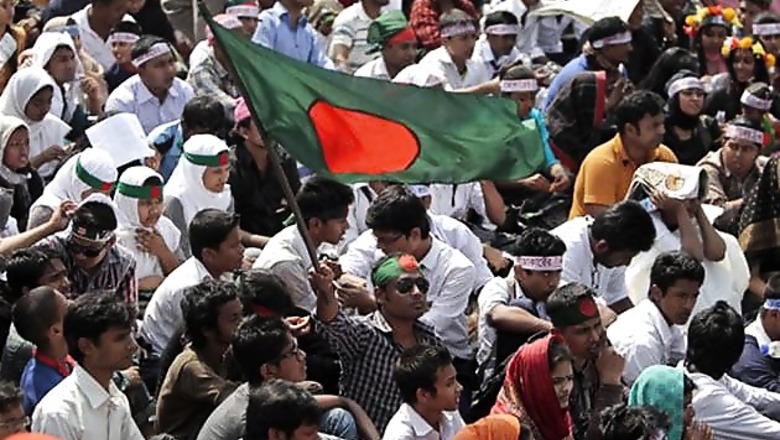
views
New Delhi: When Abdul Quader Mollah, assistant secretary-general of Bangladesh's fundamentalist Jamaat-e-Islami party, heard the country's apex court sentence him to life imprisonment on Fabruary 4 in the 1971 war criminals' trial, he must have heaved a sigh of relief. 'The Butcher of Mirpur', as he was notoriously referred to by Mukti Jodhdhas (Bangladesh liberation fighters) and as he is still called by the Awami League supporters, must have thought that a life term was the lightest sentence for a man who had been convicted for crimes ranging from raping minors to shooting and beheading more than 300 people.
According to some reports, he was smiling and even flashed a victory sign with his fingers. But the smile may just have been his undoing. A group of activists, online petitioners and bloggers were reportedly so incensed to see one of the collaborators of the Pakistan Army (known all over Bangladesh as Khan Sena) wearing a smile on his judgment day that they immediately started a spontaneous sit-in protest. It was a small gathering under the banner of the Bloggers and Activists Online Network for National Interest but news soon spread on Twitter and Facebook. Soon, in a few days, the protest of a few hundreds saw thousands and thousands of people joining in. The crowd swelled to almost half a million on Friday, the day of prayers, strikingly similar to what had happened in Tahrir Square, Cairo, when the Arab Spring had swept the Hosni Mubarak regime from Egypt. Bloggers and the power of social media have again precipitated something of an unprecedented magnitude: the largest spontaneous public gathering in Bangladesh in the last twenty years.
Earlier this month, another accused, Abul Kalam Azad, who is widely believed to have fled to Pakistan, was sentenced to death in absentia. The agitators are asking for the same punishment for Quader Mollah, the leader of the notorious al-Badr militia which is responsible for thousands of deaths which occurred in 1971. Quader Mollah is said to have supervised at least 344 killings himself, including decapitation of a prominent poet and rape of a minor - the daughter of a mukti yodhdha who was killed by the group of assailants he led. Al-shams and Razakars were certain other elements of the then Bangladeshi society who had sided with the West Pakistan authorities and perpetrated horrific atrocities on the general Bengali population.
Meanwhile, the Bangladesh government under the leadership of Sheikh Hasina, the prime minister, has decided to move the country's parliament to ban Jamaat from participation in active politics. Jamaat is Bangladesh's largest religious political party and has been a proponent of the Wahabi brand of intolerant Islam. The move came after an anti-Islamist blogger was killed on Friday, allegedly by Islamist sympathisers, amid the massive protests against Quader Mollah.
On Saturday, after visiting the slain blogger Ahmed Rajib Haidar's house in the capital's Pallabi area, prime minister Sheikh Hasina said Jamaat and its students' wing Islami Chhatra Shibir had no right to practise politics in Bangladesh as "they do not believe in democracy. They believe in terrorism and practice politics of terrorism."
On last Wednesday, the country's law minister placed a bill in the parliament proposing changes to the act to empower the government and people unhappy with any judgment of a war crimes tribunal to appeal. This gives credence to the possibility that it may appeal for death penalty for Quader Mollah.
What is underlying these protests and calls for counter strikes and meetings by the Jamaat is the secular-Islamist clash in Bangladesh. The Islamists who had seen much better days when Bangladesh was in army hands have seen their control slipping over the last decade.
About 3 million Bangladeshis were massacred in a genocide over the nine-month conflict that started from the end of March, 1971 and continued till December 16. More than 3,00,000 women were reportedly raped during the conflict, leading to massive international outcry. India intervened decisively on December 3, 1971 after Pakistan launched airstrikes on Indian targets on India's western border. It ended on December 16, with the Commander of Pakistan Army in East Pakistan (Bangladesh) Gen. AK Niazi signing the instrument of surrender in front of Indian Army officers in Dhaka. More than 93,000 West Pakistani soldiers and civilians were taken prisoners of war (PoW) and Bangladesh became an independent country.
The United States of America, under the presidency of Richard Nixon, had ordered the US Seventh Fleet, including the Enterprise Carrier Battle Group, to intimidate the Indian Navy into lifting the blockade of East Pakistan. But the Seventh Fleet arrived a tad later only to find the fight almost over and a floatilla of Soviet warships and atomic submarines in close vicinity. The Soviet fleet arrived to pre-empt any US naval misadventure in the Bay of Bengal.
More than 3 million refugees thronged India, specially West Bengal, over the nine-month period. Celebrated American poet of the Beat generation Allen Ginsberg's famous poem 'Jessore Road' depicts the tragedy of humanity as millions of people from East Pakistan left everything behind and walked to Calcutta. George Harrison and Pandit Ravi Shankar organised the 'Concert for Bangladesh' at the vaunted Madison Square Garden in New York to raise awareness about the atrocities. Fellow ex-Beatle Ringo Starr, Bob Dylan, Eric Clapton, Billy Preston, Leon Russell, Joan Baez, the band Badfinger and Ustad Ali Akbar Khan took part in one of the biggest musical extravaganza of all times held for such a cause.




















Comments
0 comment